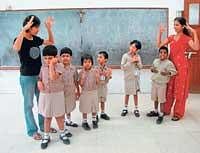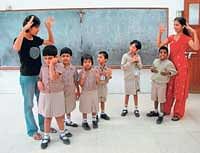
At the Speech Therapy class in Sophia Opportunity School, the teacher is making the children utter words slowly and carefully while pointing at a chart of animals. “Goat,” she says, showing them its picture and urging one student to repeat after her. “Go…,” says the boy and before he can finish, catches sight of us from the corner of his eye and bursts into giggles. Laughter is infectious, so the other kids too join in. We move away, not wanting to be a disturbance and as we walk down the corridor, we hear the students intoning clearly: “Goat. Cow. Dog….”
At another classroom, the students are silently and earnestly reading from books, while in another––an art class––they are making pretty cutouts of stars and bells; and in the third they are practising dance moves to go with a song on the forest.

Everything in the school, from the cheerful and patient teachers; the modern teaching-aids; and the airy, spacious premises; to the immaculately clean classrooms, kitchen and rest-rooms tell you that Sophia Opportunity School is not only a school for special children but one where they are taught and looked after with a very special love and care.
Established in 1972, this special school was the vision of Sister Joelle and is managed by the Sisters of Notre Dame. It is part of and also located within the campus of the mainstream Sophia High School. Currently, this co-educational special school has about 130 students on its rolls. For boys and girls, the admission begins from age three onwards but boys are retained only till age 14 while girls may continue to study till age 21. The aim of the school, says Principal Sister Naina, is to make every intellectually challenged child reach his/her maximum potential to be a happy, self-reliant and contributing member of society.
Special curriculum
So, there is a specially designed curriculum. The academic subjects include reading, writing, number work, time-concept, money-value, environmental science and social studies––all with a practical orientation. Daily living skills like grooming, brushing, bathing, eating, dressing and toileting are given priority as this is what even parents want their children to learn foremost. Besides, there are speech-therapy classes to help children become articulate and physiotherapy for physical fitness. The day begins with an hour-long session of yoga, perceptual exercises and brain-gym exercises.
Students are also taken for picnics and outstation excursions. Vocational training is imparted through practical sessions in the bakery, kitchen, canteen and weaving unit. Most students who pass out go to work at their family business or at other places but always under adult supervision, we are told.
Since the focus is a rounded education; the students are also taught music, dance and general movements, and sports. In fact, the Sophia Opportunity School’s children participate with the regular (Sophia High School) students in sports events. This was one of India’s first schools for special children to introduce computer-assisted education. Academically, those special children who show promise are made to appear for the tenth class exams of the National Open School.
The highlight of this school is the Infant Stimulation Centre (set up in 2000) for children between three months and three years. The brain grows rapidly from birth to age three. So, early intervention and stimulation for babies at risk of developmental delay, especially autistic infants, makes a huge positive difference to their development. Various sensory stimulation and therapeutic interventions help the baby catch up with its regular peers.
And many children have indeed joined the mainstream or regular schools afterwards!
We also notice that all the children look very healthy. No running noses or coughs despite this being the season for these problems, we comment. Sister Naina tells us that they worked to make it this way––by applying Nambudripad’s Allergy Elimination Techniques (NAET) which keep allergies and allergy-related illnesses at bay. Sister Naina and Sister Sujaya make NAET also available to the public at a clinic in Koramangala.
Teachers with special skills
Attending to special children requires specially skilled teachers. Not only do the teachers have to undergo certain courses which equip them to deal with developmentally challenged children but above all, they should be patient and compassionate which are two qualities vital for handling special children, explains Sister Naina. There are also volunteers too who come in to help. Besides, there are some teachers’ assistants who are actually ex-students of the school.